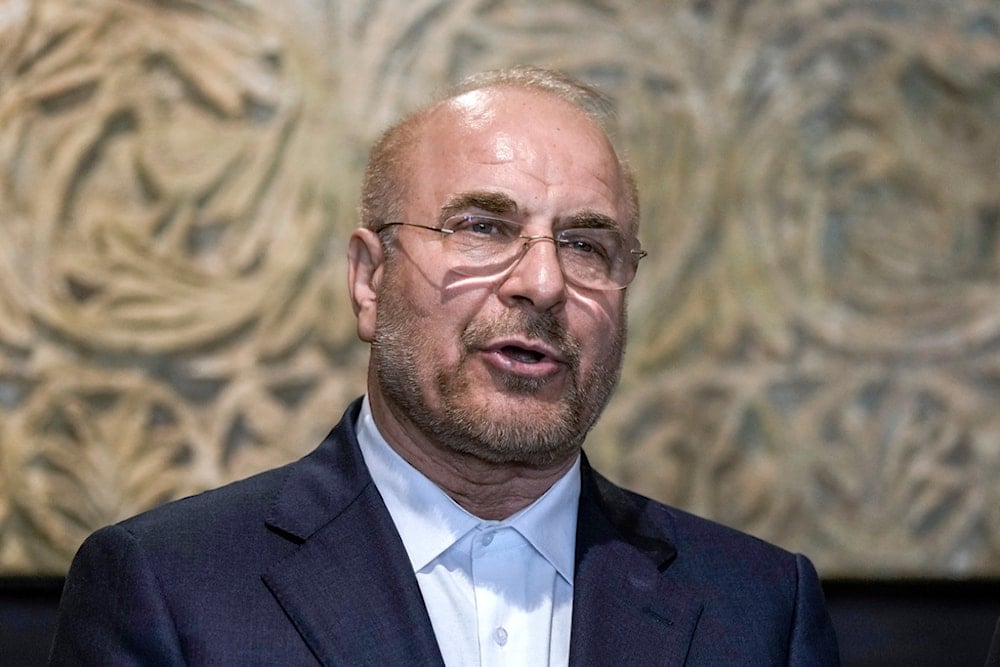Iran's response shook 'Israel' like never before in 80 years: Qalibaf
Iran's 12-day retaliation inflicted unprecedented damage on the Israeli occupation, exposing military vulnerabilities and causing billions in economic losses.
-

Iran's parliament speaker Mohammad Bagher Qalibaf, speaks during a press conference in Beirut, Lebanon, Saturday, Oct. 12, 2024. (AP Photo/Bilal Hussein)
Mohammad Bagher Qalibaf, speaker of Iran's Parliament, affirmed Tuesday that the Islamic Republic had confronted the Israeli occupation head-on with courage and precision, dealing a historic blow that has reverberated across the region. His remarks follow the conclusion of a 12-day confrontation that not only upended "Israel's" strategic posture but also shattered the myth of its military invincibility.
"What happened during the 12 days of war was something the occupation had not witnessed in 80 years of criminal assaults," Qalibaf declared. He noted that Iran's carefully calibrated response exposed glaring weaknesses in the Zionist regime's defense architecture. "There is no country that has the courage or the capability to decide to strike the Israeli entity," he added. "But Iran had both."
Measured retaliation
The confrontation began on June 13, when the Israeli regime carried out unprovoked strikes on Iranian nuclear and military sites, a move widely condemned by Tehran as a blatant act of aggression. Iran's response was swift, precise, and unprecedented: waves of missiles and drones targeted Israeli intelligence hubs, military compounds, and strategic infrastructure. Despite Tel Aviv's advanced defense systems, a significant number of projectiles reached their targets, forcing even Israeli officials to admit to extensive damage.
According to figures published by the occupation's own Finance Ministry, the war inflicted over 10 billion shekels (approx. $3 billion) in direct losses, excluding the cost of replenishing defense systems. Israeli Finance Minister Bezalel Smotrich estimated the total burden could climb to $12 billion, at a time when "Israel" is already economically strained by years of military aggression. Even US President Donald Trump acknowledged the scale of destruction, remarking, "Those ballistic missiles, boy, they took out a lot of buildings."
Read more: 'Israel' faces massive economic fallout from its war on Iran
Iranian President Masoud Pezeshkian echoed Qalibaf's assessment, warning that "Israel's" actions could have led to a catastrophic regional escalation had Iran not exercised strategic restraint. "Had Iran not responded to the Israeli aggression, the region would have faced a full-scale war that could not be contained," Pezeshkian stated, underlining that Iran's disciplined retaliation both deterrence and diplomacy in equal measure.
Deterrent triumph
Foreign Minister Abbas Araghchi also affirmed that the Israeli assault was a calculated provocation and that Iran's counterstrikes were a legitimate act of self-defense. "War has never been our choice," he said in an interview with China's CGTN. "But if it is imposed on us, we are completely ready." Araghchi noted that Iran remains on high alert and that any ceasefire violations by the occupation will be met with immediate and forceful responses.
Araghchi also highlighted the danger of attacking peaceful nuclear facilities, warning of potential environmental disasters and calling such acts "unforgivable." He urged global actors to support diplomatic solutions and emphasized that Iran continues to honor its commitments to peaceful nuclear development, placing the blame for the ongoing crisis squarely on Washington's unilateral withdrawal from the 2015 nuclear deal.
Strategic victory
The 12-day war concluded with a ceasefire widely seen as a political and strategic setback for "Israel," which failed to achieve any of its objectives and emerged militarily damaged, economically weakened, and diplomatically cornered. In contrast, Iran demonstrated its growing deterrent power and reaffirmed its pivotal role in the regional balance of power, not through mere rhetoric, but through effective, coordinated resistance.
As Qalibaf asserted, Iran's actions were not only a defense of national sovereignty but a clear signal that the era of unreciprocated Israeli aggression is over.
Read more: Israeli strike on Iran Evin prison to be probed as war crime: Amnesty

 4 Min Read
4 Min Read









